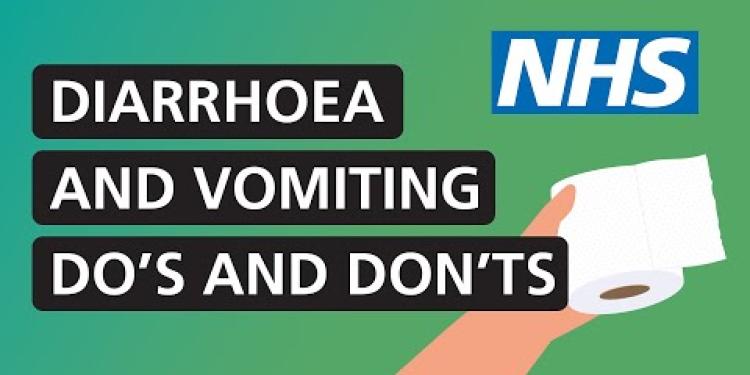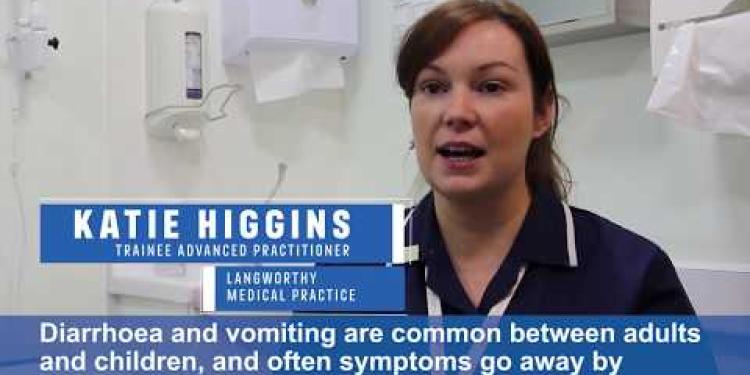Important Information On Using This Service
- Ergsy carefully checks the information in the videos we provide here.
- Videos shown by YouTube after a video has completed have NOT been reviewed by ERGSY.
- To view, click the arrow in the center of the video.
Using Subtitles and Closed Captions
- Most of the videos you find here will have subtitles and/or closed captions available.
- You may need to turn these on and choose your preferred language.
Turn Captions On or Off
- Go to the video you'd like to watch.
- If closed captions (CC) are available, settings will be visible on the bottom right of the video player.
- To turn on captions, click settings.
- To turn off captions, click settings again.
Find A Professional
What is Norovirus? (Diarrhoea and Vomiting Bug) | NHS
Introduction to Norovirus
Norovirus is a highly contagious virus that causes gastroenteritis, which leads to inflammation of the stomach and intestines. Commonly referred to as the "diarrhoea and vomiting bug," this virus is notorious for causing outbreaks in communities, especially in places such as schools, care homes, and cruise ships.
Symptoms of Norovirus
Symptoms of norovirus infection usually appear suddenly and include severe vomiting, watery diarrhoea, nausea, and stomach cramps. Some people may also experience a slight fever, headaches, and aching limbs. These symptoms can be unpleasant but typically last for only a few days. Dehydration is a major concern, particularly for the young, elderly, and those with weakened immune systems.
Transmission of Norovirus
Norovirus spreads very easily and quickly from person to person. You can contract the virus by coming into contact with an infected person, touching contaminated surfaces or objects, or consuming contaminated food or water. The virus can survive on surfaces for several days, making it crucial to maintain good hygiene practices during an outbreak.
Treatment and Prevention
There is no specific treatment for norovirus. To manage the symptoms, NHS recommends drinking plenty of fluids to prevent dehydration, getting ample rest, and taking medication such as paracetamol for fever and aches. Avoid handling food, and practice thorough hand washing with soap and water. Alcohol-based hand sanitisers are not as effective against norovirus.
When to Seek Medical Advice
Most people recover from norovirus within a few days without needing medical attention. However, if symptoms persist, or if you or someone you care for becomes severely dehydrated, it's important to seek medical advice. Look out for signs of dehydration such as infrequent urination, dry mouth, and feeling lightheaded.
Conclusion
Norovirus, while unpleasant, is generally short-lived. By maintaining good hygiene practices, staying hydrated, and being cautious during outbreaks, you can help to prevent the spread of this common but troublesome virus.
What is Norovirus? (Diarrhoea and Vomiting Bug) | NHS
Introduction to Norovirus
Norovirus is a virus that makes you sick. It leads to diarrhoea and vomiting. Many people can get it, especially in schools, care homes, and cruise ships.
Symptoms of Norovirus
Norovirus symptoms come quickly. You might vomit a lot, have watery diarrhoea, feel sick, or have stomach pain. Sometimes you may have a small fever, headache, or your arms and legs might hurt. These go away in a few days. Drink lots of water because you can get dehydrated, especially if you are young or elderly.
Transmission of Norovirus
Norovirus spreads very easily. You can get it from a sick person, touching dirty things, or eating dirty food. The virus stays on surfaces for days, so wash your hands often to stop it from spreading.
Treatment and Prevention
There is no special medicine for norovirus. Drink lots of water, rest, and take medicine like paracetamol for fever. Don’t touch food until you feel better. Wash your hands with soap and water because hand gels don't work well on norovirus.
When to Seek Medical Advice
Most people get better in a few days without seeing a doctor. But if you still feel sick after a few days, or you are very dehydrated, see a doctor. Signs of dehydration are not going to the toilet often, dry mouth, and feeling dizzy.
Conclusion
Norovirus is not fun, but it goes away quickly. Keep clean, drink water, and be careful when it's around. This helps stop others from getting sick too.
Frequently Asked Questions
What is norovirus?
Norovirus, often referred to as the 'winter vomiting bug', is a highly contagious virus that causes gastroenteritis, leading to symptoms like diarrhoea and vomiting.
What are the main symptoms of norovirus?
The main symptoms of norovirus include sudden onset of nausea, vomiting, and diarrhoea. Some people may also experience a high temperature, abdominal pain, and aching limbs.
How is norovirus spread?
Norovirus spreads easily through close contact with an infected person, touching contaminated surfaces, or consuming contaminated food or water.
How long do norovirus symptoms last?
Norovirus symptoms typically last for about 1 to 2 days, but you may still be contagious for a short period after symptoms improve.
Can I get norovirus more than once?
Yes, it is possible to get norovirus multiple times because there are many different strains of the virus, and immunity to one strain does not protect you against others.
How can I prevent the spread of norovirus?
To prevent the spread of norovirus, wash your hands often with soap and water, disinfect contaminated surfaces, and avoid preparing food for others while symptomatic.
Is there a treatment for norovirus?
There is no specific treatment for norovirus. It is important to stay hydrated by drinking plenty of fluids, and you might use over-the-counter medications to manage symptoms.
When should I see a doctor about norovirus?
You should see a doctor if your symptoms are severe, such as persistent vomiting and diarrhoea that doesn’t improve, signs of dehydration, or if you have underlying health conditions.
Is norovirus more common during certain times of the year?
Although norovirus can occur at any time of the year, it is more common in the winter months.
Can norovirus be serious?
Norovirus is generally not serious for most people, but it can be more severe for young children, the elderly, and those with weakened immune systems due to the risk of dehydration.
Is norovirus the same as food poisoning?
Norovirus can be a cause of food poisoning when it contaminates food or water. However, food poisoning can also be caused by other bacteria, viruses, and toxins.
How long does norovirus live on surfaces?
Norovirus can survive on surfaces for several days, making it important to clean and disinfect thoroughly to prevent the spread.
Can I go to work or school with norovirus?
You should stay home while you are symptomatic and for at least 48 hours after symptoms stop to avoid spreading the virus to others.
How is norovirus diagnosed?
Norovirus is generally diagnosed based on symptoms. In some cases, stool samples may be tested to confirm the presence of the virus.
Can norovirus be prevented by vaccination?
Currently, there is no vaccine available for norovirus. Preventive measures focus on good hygiene and food safety practices.
What is norovirus?
Norovirus is a germ that makes people sick. It can give you a tummy ache, make you throw up, or give you diarrhea.
Norovirus spreads easily. You can catch it if you touch things that have the germ on them or if you are close to someone who is sick.
Wash your hands well to keep safe.
If you want help with reading, you can ask an adult or use tools that read the text out loud.
Norovirus is a virus that can make you feel very sick. People often call it the 'winter vomiting bug'. It is easy to catch and can give you a bad tummy ache, make you throw up, and give you diarrhoea.
What are the main signs of norovirus?
Norovirus is a germ that makes you feel sick. Here are the main signs:
- Feeling like you need to throw up (nausea)
- Throwing up (vomiting)
- Runny tummy (diarrhea)
- Tummy ache or pain
If you feel these signs, tell a grown-up. Wash your hands often to stop the germ from spreading. It's good to drink water so you don't get too thirsty.
Norovirus can make you feel sick very quickly. It can make you feel like you need to throw up and give you diarrhea. Some people might also get a high fever, tummy pain, and sore arms and legs.
If you need help reading, you can ask someone to read with you or use audiobooks.
How does norovirus spread?
Norovirus is a germ that makes people sick. It can spread easily from one person to another.
Here is how it spreads:
- Touching things that have the germ on them, like doorknobs or toys.
- Being close to someone who is sick and breathing the same air.
- Eating food or drinking water that has the germ in it.
To stay safe and healthy, wash your hands often with soap and water. Avoid touching your face, and keep things clean around you. If you are sick, stay away from others.
Remember, ask an adult if you need help or have more questions.
Norovirus is a tummy bug that can make you sick. It can spread from person to person. You can get it if you touch things that have the virus on them or if you eat or drink things with the virus.
How long do you feel sick with norovirus?
Norovirus can make you feel sick.
Most people feel better in 1 to 3 days.
Rest and drink water to help you feel better.
When you have norovirus, you can feel sick for 1 to 2 days. Even after you feel better, you can still spread germs for a little while.
Can I catch norovirus again?
Yes, you can catch norovirus more than once. Your body does not stay protected from it. Make sure to wash your hands often to stay safe.
Yes, you can get norovirus more than once. This is because there are many different types of the virus. Getting sick from one type does not stop you from getting sick from another type.
How can I stop norovirus from spreading?
Here are some tips to help stop norovirus from spreading:
- Wash your hands with soap and water often. Do this after using the toilet and before eating.
- Clean surfaces with cleaner. Wipe tables, counters, and other things people touch.
- Wash food before you eat it. Rinse fruits and vegetables well.
- If you feel sick, stay at home and rest. This way, you won't spread germs.
- If you use the toilet, clean it well afterwards.
Support Tools:
- Use picture charts to help remember these steps.
- Set reminders to wash hands regularly.
- Ask someone to help if you have trouble cleaning.
To stop norovirus from spreading, wash your hands a lot with soap and water. Clean places that might have germs. If you feel sick, don't cook food for other people.
Can you help get rid of norovirus?
There is no special medicine for norovirus. It is important to drink lots of water and other drinks so you don't get thirsty. You can also take medicine from the pharmacy to help with how you feel.
When should I go to the doctor for norovirus?
Norovirus is a common virus. It can cause an upset tummy, feeling sick, and throwing up.
Here are signs you should see a doctor:
- If you have been sick for more than a few days.
- If you can't drink water or are very thirsty.
- If you feel very weak or dizzy.
- If you have a high fever that doesn't go away.
- If there is blood in your poo or throw-up.
Ask an adult for help if you feel very sick.
These tools can help:
- Ask someone to read with you.
- Use a picture dictionary.
Go to the doctor if you are very sick. This means if you are throwing up a lot, have tummy problems that don't get better, if you are very thirsty, or if you already have other health issues.
Does norovirus happen more at some times in the year?
Norovirus is a tummy bug.
It can make you feel sick and give you diarrhea.
Norovirus happens more in winter.
Use pictures and videos to help understand.
Ask someone you trust to explain things.
Norovirus can happen any time of the year. But it usually happens more in the winter.
Can norovirus make you very sick?
Most people with norovirus feel better after a few days. But sometimes, it can make you very sick. If you can't stop throwing up or having diarrhea, you should see a doctor.
Here are some tips to stay healthy:
- Drink lots of water to stay strong.
- Wash your hands often.
- Rest when you feel tired.
Norovirus is a germ that makes people sick. Most people get better quickly, but it can be worse for young kids, older people, and people who are already sick. This is because it can make them very thirsty.
Is norovirus the same as food poisoning?
No, norovirus and food poisoning are not exactly the same.
Norovirus is a type of virus that makes people sick.
Food poisoning happens when you eat food that has germs that make you sick.
Both can make your tummy hurt and make you feel sick.
If you don’t feel well, tell an adult. Drink water and rest.
Use pictures and simple words to understand better.
Norovirus can make you sick if it gets into your food or water. But other germs and bad stuff can also make you sick from food.
How long can norovirus stay on things?
Norovirus can live on things like tables or doorknobs for a long time. It can stay there for days! This means you can still catch it from touching these things.
To stay safe, remember to wash your hands a lot with soap and water. Clean the surfaces often, too.
Norovirus is a germ that can stay on things like tables and doorknobs for days. It's important to clean and wipe down everything really well to stop it from spreading.
Can I go to work or school if I feel sick with norovirus?
No, it is best to stay home if you have norovirus.
Norovirus is a bug that makes your tummy hurt. It can also make you feel like you need to throw up or have diarrhea.
Staying home helps you get better and stops others from getting sick too.
Tell your teacher or boss that you are sick.
Wash your hands often and rest until you feel good again.
You can use tools like reminders to wash hands or pictures showing how to rest.
You should stay home while you feel sick. Stay home for at least 2 days after you feel better. This helps stop germs from spreading to other people.
How do doctors find out if you have norovirus?
Doctors usually figure out if someone has norovirus by looking at their symptoms. Sometimes, they might check a poop sample to be sure the virus is there.
Is there a needle to stop norovirus?
Right now, there is no shot to stop norovirus. To stay safe, we need to keep clean and make sure our food is safe to eat.
Useful Links
Useful links from: Dealing with Common Childhood Illnesses
- NHS - Childhood illnesses This NHS page provides an overview of common childhood illnesses and how to spot their symptoms. It also covers when to seek medical advice.
- NHS - Common health questions: Children's health A collection of frequently asked questions about children's health, answered by the NHS. Topics include fever management, vaccinations, and dealing with common ailments.
- Great Ormond Street Hospital - Conditions and Treatments Great Ormond Street Hospital's resource for understanding various childhood conditions and the treatments available. The site offers detailed information on specific illnesses.
- The Lullaby Trust - Illnesses and infections The Lullaby Trust provides advice on safer sleep for babies and key information on dealing with illnesses and infections in infants.
Useful links from: Understanding Seasonal Flu: Prevention and Treatment
- NHS - Flu Comprehensive guide by the NHS on flu, including symptoms, causes, diagnosis, treatment, and prevention tips.
- NHS - Flu vaccination Detailed information from the NHS about the flu vaccine, who should get it, how it works, and its effectiveness.
- Asthma UK - Flu and People with Asthma Advice from Asthma UK on the impact of the flu on people with asthma, including prevention tips and the importance of vaccination.
- British Lung Foundation - Flu (influenza) The British Lung Foundation's resource providing information on flu, how it affects people with lung conditions, and preventive measures.
Useful links from: How to treat diarrhoea and vomiting at home (adults and children aged 5 and over) | NHS
- NHS - Diarrhoea and vomiting NHS guide on how to treat diarrhoea and vomiting in adults and children aged 5 and over. The page provides information on symptoms, treatment, and when to see a doctor.
- Health A-Z: Diarrhoea NHS page that offers comprehensive information on diarrhoea, including causes, symptoms, diagnosis, and treatment options.
- Patient.info - Diarrhoea Patient.info provides detailed information about diarrhoea, including its causes, symptoms, and home treatment tips. Also offers guidance on when to seek medical help.
- ERIC - The Children’s Bowel & Bladder Charity ERIC (Education and Resources for Improving Childhood Continence) offers resources and support for managing diarrhoea in children. The site includes practical advice for parents and caregivers.
Useful links from: Advice for diarrhoea and vomiting
- NHS - Diarrhoea and Vomiting The NHS provides comprehensive advice and guidance on managing diarrhoea and vomiting, including causes, treatments, and when to seek medical help.
- NHS Inform - Diarrhoea NHS Inform offers detailed information on the causes of diarrhoea, its treatment, and ways to prevent it, as well as advice on when to consult a doctor.
- British Red Cross - First Aid Advice for Diarrhoea and Vomiting The British Red Cross provides first aid advice for handling diarrhoea and vomiting, including practical tips on care and when to seek medical assistance.
- ERIC - The Children's Bowel & Bladder Charity ERIC UK offers focused advice on managing diarrhoea in children, covering symptoms, possible causes, and treatment strategies.
Have you found an error, or do you have a link or some information you would like to share? Please let us know using the form below.
- Ergsy carfully checks the information in the videos we provide here.
- Videos shown by Youtube after a video has completed, have NOT been reviewed by ERGSY.
- To view, click the arrow in centre of video.
- Most of the videos you find here will have subtitles and/or closed captions available.
- You may need to turn these on, and choose your preferred language.
- Go to the video you'd like to watch.
- If closed captions (CC) are available, settings will be visible on the bottom right of the video player.
- To turn on Captions, click settings .
- To turn off Captions, click settings again.




